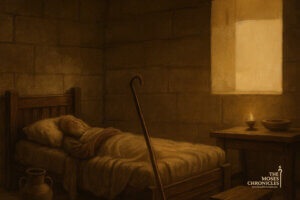The Raw Humanity of Israel’s Blessings — One Reader’s Favorite Scene
Sometimes the most sacred moments in biblical fiction are not grand miracles or divine appearances, but the trembling hands of a dying father and the silent ache in a room full of sons.
In The Moses Chronicles: Prelude, few scenes capture this quiet, unfiltered tension like Israel’s final blessing. It is not a sweet goodbye. It is not a neat inheritance. It is, as one reader put it:
“In the beginning, the most moving scene was when Joseph, with his strength and power, held his frail, dying father’s hand—not as ruler of Egypt, but as a child to a parent.” — Tricia
This blessing is raw. Human. Beautiful.
It’s not just Joseph’s grief that touches the reader. It’s the awkward silence from Reuben. The tension in Simeon and Levi’s eyes. The burden that falls unexpectedly on Ephraim and Manasseh. It’s the way Dinah holds her father’s hand, even as she is barely counted.
Israel’s words are not gentle. They are prophetic, often cutting. They elevate some, rebuke others, and reroute destiny. And through it all, there is no fanfare—just breath and dust, inheritance and silence.
When the Words Cut and Heal at Once
In most retellings of the Exodus, we begin with oppression. But Prelude starts in a tent, in a father’s bed, in the tension of unfinished stories.
Israel’s blessing of his sons is more than a family moment. It is a divine reordering of legacy.
Judah receives a royal line. Joseph receives a double portion. Reuben, once the firstborn, loses his preeminence. Ephraim and Manasseh are pulled into the inheritance as full sons, forever shifting the count of tribes.
And yet, what makes this scene unforgettable is not just the theology or prophecy.
It’s the human weight.
No one is arguing.
But everyone is holding their breath.

Excerpt: The Blessing Unfolds
Joseph swallowed hard, gripping his father’s frail hands. All the years of suffering, the betrayal, the pain—it had all led to this moment.
And then, Israel’s gaze shifted to Ephraim and Manasseh.
Joseph’s sons, no longer boys, but young men—young men who now stood as equals among their uncles.
Israel lifted a trembling hand, motioning for them to step forward.
“Ephraim and Manasseh shall be mine, just as Reuben and Simeon are mine.”
A shift. A change in inheritance.
Reuben flinched, but he did not protest. He knew. Bilhah—his place was lost.
“The blessings of your fathers shall surpass the blessings of the ancient mountains. The God of your father shall help you, and He shall bless you with blessings of the heavens above.”
It was done.
Ephraim and Manasseh had been fully counted among the tribes of Israel. Joseph had been given a double portion.
No one spoke. No one argued.
Israel exhaled, his body sinking into the linens. Slowly, he drew his feet up into the bed, his hands falling still upon his chest.
A single breath.
And then, he was gone.
Why This Scene Lingers
This moment resonates because it reminds us that even the patriarchs bled, wept, failed, forgave.
It reminds us that blessings do not always sound like comfort. Sometimes, they sound like truth.
This is where biblical fiction breathes: in the unsaid, the unhealed, the uncertain. It’s not just about what happened. It’s about how it felt.
In a genre often filled with spectacle, Prelude gives us something else: breath, silence, memory.
📖 Download 7 Free Chapters (No Sign-Up Needed)
We’re offering seven chapters—three from Prelude, four from Hands That Rock the Cradle—so you can begin the journey yourself.
✅ Experience biblical fiction rooted in legacy, grief, and sacred promise
✅ Read the moment Joseph is no longer a ruler, but a son
✅ Walk the ancient path where family, faith, and prophecy collide
📩 Click here to download your free sample
Learn more about:
👉 Prelude
👉 Hands that Rock the Cradle
🌍 International Readers
We’ve made it easier for you to pay in your local currency. Visit your country-specific page:
🇰🇪 Kenya
🇳🇬 Nigeria
🇿🇦 South Africa
🇵🇭 Philippines
About the Author
RR Wekesa is a Christian historical fiction author writing faith-rich novels that follow the ancient paths of Scripture, weaving sacred silence and poetic rhythm into every chapter of The Moses Chronicles.
